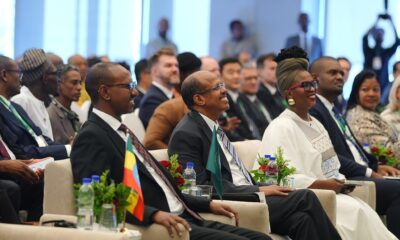Political Issues
Ambode and the ethical rebirth agenda -By Ayo Olukotun
On Tuesday, the Governor of Lagos State, Akinwunmi Ambode, called for an ethical rebirth as part of the country’s bid to fast-track development and good governance. Ambode went on to explain that the overriding need to encourage public civility and good moral conduct, was the reason he created the office of the Special Adviser on Civic Engagement.
To be sure, some other members of the All Progressives Congress have spoken on similar lines in the recent past. Two months back, a former Abia State Governor and now Minister of Science and Technolgy, Dr. Ogbonnaya Onu, informed that the change agenda of President Muhammadu Buhari, would include an ethical component, and restore the nation’s lost moral values. As a matter of fact, well before the current administration, successive leaders had embarked upon various projects of ethical and, moral reconstruction, regrettably to little effect. Many will remember for instance, that the so-called ethical revolution of former President Shehu Shagari was laughed out of court by Nobel laureate, Prof. Wole Soyinka, in a record entitled, “Etikarevowetin?”. There also was the War against Indiscipline programme under the military government of Buhari which attempted with little success to instil disciplinary virtues in the average Nigerian.
In the same vein, under the Babangida administration, there was the creation of the Mass Mobilisation for Self-Reliance, Social Justice and Economic Recovery, headed by Prof. Jerry Gana. Subsequently, there was the formation of the National Orientation Agency, charged similarly with the idea of creating in us, better civic awareness as well as value change. The various efforts, directed at ethical rebirth achieved very little, principally because they were ill-focused, and did not receive the backup of strong moral leadership, and institutions which would have given them vitality. In a phenomenon, referred to by this writer as the tragedy of reforms without reformers, what we find is a lack of fit between the pronouncement of leaders and the moral squalour of the governance system. For instance, if a government presided over electoral heist of unimaginable proportion or was scheming to elongate its tenure through unorthodox methods, it is a most unlikely teacher of sound ethics and moral values. As many commentators have appreciated, the ascetic lifestyle of Buhari provides a window, though a small one for undertaking a programme of ethical rebirth as Ambode suggested.
Before elaborating on this idea, I crave the reader’s indulgence to enter a short take. It is obvious, from the events unfolding in Kogi State, that a resolution of the impasse created by the sudden death of the APC gubernatorial candidate, Abubakar Audu, cannot be resolved outside of the recognition of James Faleke. Faleke held a joint ticket with the deceased candidate with whom he was coasting to victory. Although the Independent National Electoral Commission declared the election inconclusive, it stands to reason and obeys the jurisprudence of the doctrine of necessity that Faleke should have been made the torch bearer, while adopting a deputy governorship candidate from the majority ethnic extraction in the state, for reasons of electoral strategy. That is a way of saying that the joint ticket of Faleke, and Audu’s son, would have been the easy way out of the logjam. As renowned constitutional lawyer, Prof. Itse Sagay, commented recently (See The PUNCH, November 29, 2015) “they already have two candidates-the running mate, who is surviving as a candidate, and all they need to do is to pick someone else from the same senatorial district as the deceased that will be the running mate of Faleke. I don’t know why people avoid simple things and then go and complicate life for themselves.”
It is precisely the avoidance of the easy way of resolving the problem for reasons that remain mysterious that has deepened the running palaver. Pertinent too is the informed opinion of Prof. Niyi Akinnaso (The PUNCH, December 1, 2015) that in an age when sudden deaths have become frightening realities, vetting the health status of candidates can no longer be pushed under the carpet, or bypassed.
Getting back to the main discourse, it is pertinent to observe that no country as far as this columnist is aware has made developmental breakthrough in the absence of ethical rebirth and value reorientation. The reason is simple. It is the trinity of policies, institutions, and values which jumpstart nations in the race for development. Important as good institutions and the right policies are, values, and the right ethical software are the conveyor belts through which they become operational and self-reproducing.
At one level, this is a discussion about corruption and the need to reduce it in public life as Buhari has pledged to do. It should be noted, however, that ethical rebirth is a wider subject than corruption because, while all corruption are ethical infractions, not all ethical infractions are acts of corruption. For, there are cases where public officials may not have acted corruptly bearing in mind that the word carries criminal overtones, but may have manifested shabby ethics and comportment.We can amplify this further, by stating that the dearth of role models in the country today, is traceable to the moral compromises, and lousy standards which prevail, in public and social life. A time there was when judges were viewed with the awe and respect appropriate to their callings as impartial arbiters and trustees of the nation’s conscience. Today, if a prominent public official is to be believed, some judges pay money to be deployed to election tribunals. The expression, “as grave as a judge” has long lost its relevance.
A related issue is to ask the question: Why are the codes of conduct of our professional associations more often than not observed in the breach? Considering that those elected or appointed to government come from the ranks of our professionals, the issue of ethical rebirth goes beyond the running of a cleaner government than we have hitherto done.
And, so, while government must set the standards and lead by example, our professionals must be mobilised to reinstitute ethical principles. The danger we face is that we are approaching a situation where moral absurdities and scandals have been so normalised that many young people are not even aware that they are wrong. There is also the point that we are throwing our youths into a society without ethical foundations, or moral compass. Obviously, youths who go through school plagiarising or “sorting” their lecturers, and gain employment by faking certificates, are unlikely to see anything wrong in the ethical meltdown, in which the nation finds itself.
What then is to be done? Buhari should play an activist role, by coming out of his current posture of not requiring his ministers to follow his example by, for instance, declaring their assets. Secondly, there must be a campaign around the kind of values and ethics that the nation requires to lift itself from the current moral downturn. In this respect, we must ensure that both actions and precepts converge. The rumbles about selective targeting of political opponents take something away from the laudable anti-corruption project, and efforts must be made to address the issues
In sum, there is a need to complement the anti-corruption war by an ethical rebirth involving all strata of society.











